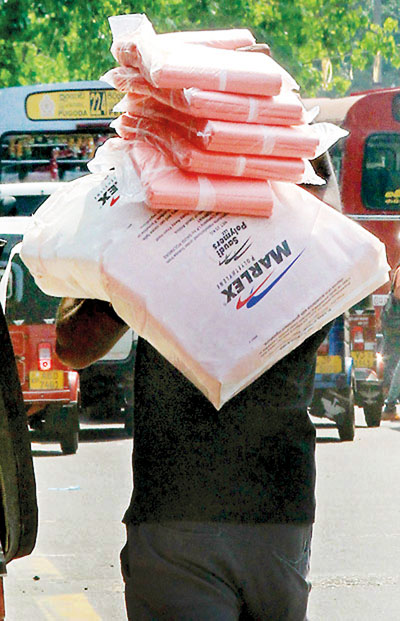News
Reusable bags diktat doubles plastic imports
View(s):
Thicker bags are not bio-degradable and are worsening the plastic waste problem. File pic
By Chrishanthi Christopher
Environmentalists and industrialists last week claimed that the government’s strategy to reduce the heavy use of polythene used by the public by dictating the production of thicker, reusable bags.In fact, thicker bags will produce more plastic waste in the environment and require more resin. Various types of resin are used to make packaging.
They said the dormant 2007 legislation that was revived in January 2016 by President Maithripala Sirisena, who is also Environment Minister, to require plastic bags thicker than 20 microns has led to the doubling of resin imports.
Environmentalist, Supun Lahiru Prakash, of the Bio-diversity and Research circle said the government introduced the 20 microns specification to encourage the public to re-use plastic bags. But consumer behaviour has not changed.
He said supermarkets and retail stores are generously handing out shopping bags and even thicker bags that can be re-used are being discarded.The thicker bags are not bio-degradable and are worsening the plastic waste problem.
In addition, the public’s dependency on polythene to wrap food, confectionery, bakery items and biscuit is compounding the situation.According to research by the Central Environment Authority and the Kelaniya University, 20 million lunch sheets are being used and discarded every day.
Chairman, Advisory committee on Packaging, Anton Hemantha, agreed that almost double the amount of resin is being imported into the country by manufacturers producing polyethylene wrappings is in keeping with the new requirement.
Industry figures said 15,000 metric tonnes of polyethylene is imported every month.
The industry is against a ban on the use of plastic for food wrapping.Hemantha said re-use and recycling should be encouraged.
He called on the government to encourage industries that add value to the polyethylene waste. He said industries making plastic pellets, roof tiles, wire mesh and irrigation pipes out of recycled plastics should be encouraged.
This coupled with proper collection methods from households could help.
“Bins can be placed at supermarket entrances to encourage responsible disposal of shopping bags,’’ he said.
Another area that need focus is regulation and monitoring of the manufacturing sector. Millions of plastic bags are being churned out by unregistered factories operating in the backyards of homes.
Plastic Packaging Association, Chairman, Sarath Wijesinghe, said the CEA should ensure compliance and educate people in the responsible disposal of polythene.Educating children and adults on the damage to the environment would be useful.
Kalutara Chamber of Commerce, director, R T Premasiri said it would be ‘foolish’ to ban lunch sheets overnight as there is no alternative.
He said the usual cliché of turning to the traditional banana/lotus leaf will not work as there are not enough banana trees.
He said the government has collected cess on plastic over a period of 10 years adding up to Rs 4.68 billion as of 2016. This money could be used for consumer education and recycling. Also small and medium enterprises can be granted loans and subsidies to start value added plastic industries. The government charges cess of 5 per cent per kilogram of resin imported.
Polydime Industry, marketing officer, Yohan Tranchel, based in Ambatale, said the industry was exporting crushed plastics to India, Asia, and Europe.He said that in areas such as Hambantota and Galle there are women who collect used plastic for recycling.
CEA, Solid Waste Management, director, Sarath Kumara, said there are 40 recycling and collecting centres and that wet plastic was a problem. He said these plastics cannot be recycled as they are soiled with oil and gravy from food. There are discussions to solve this problem.
He said the CEA, through the media, is discouraging people from excessive and indiscriminate use of shopping bags and lunch sheets.
Also the CEA in collaboration with the Education Ministry is carrying out awareness programmes at district level.

